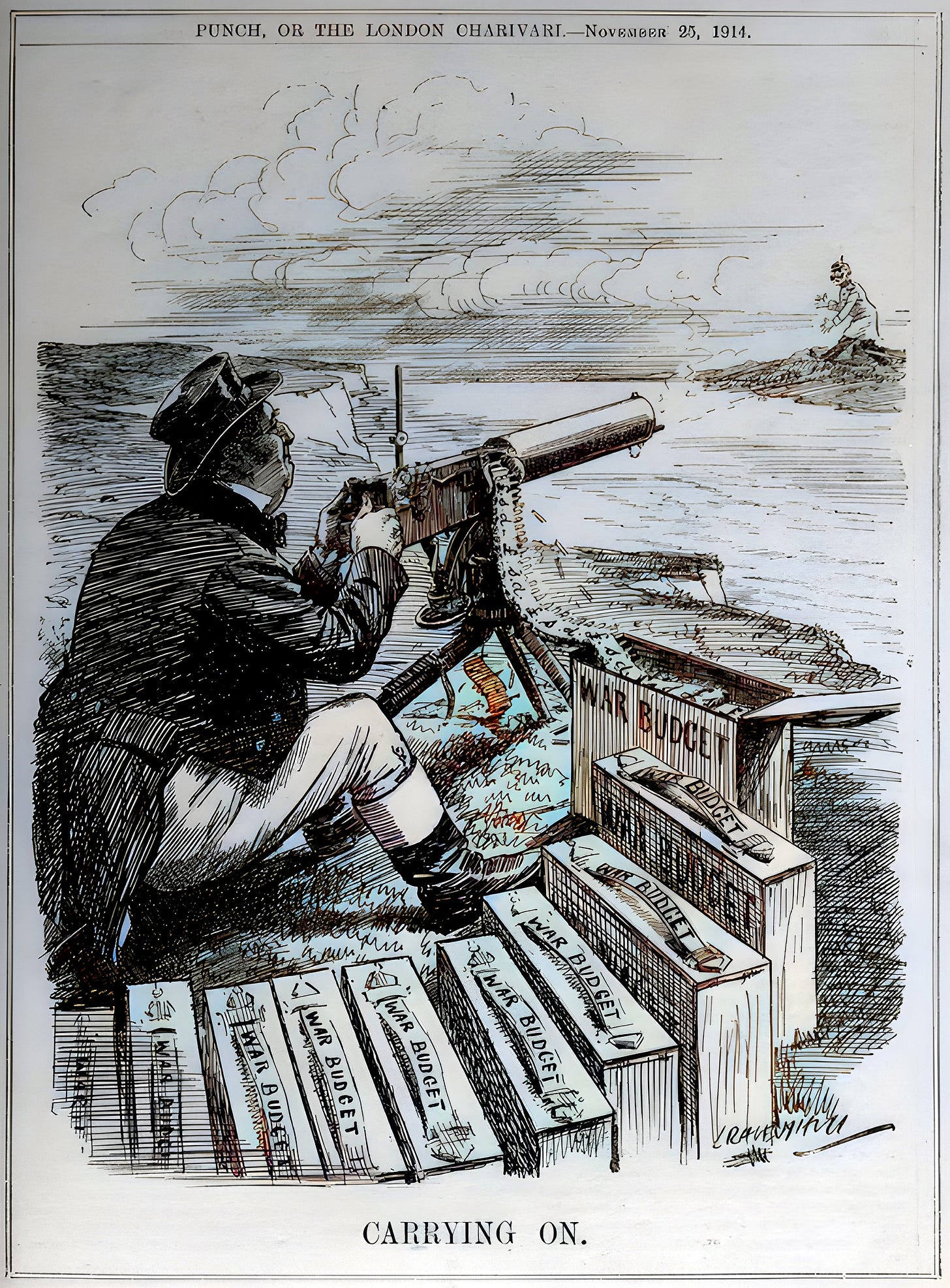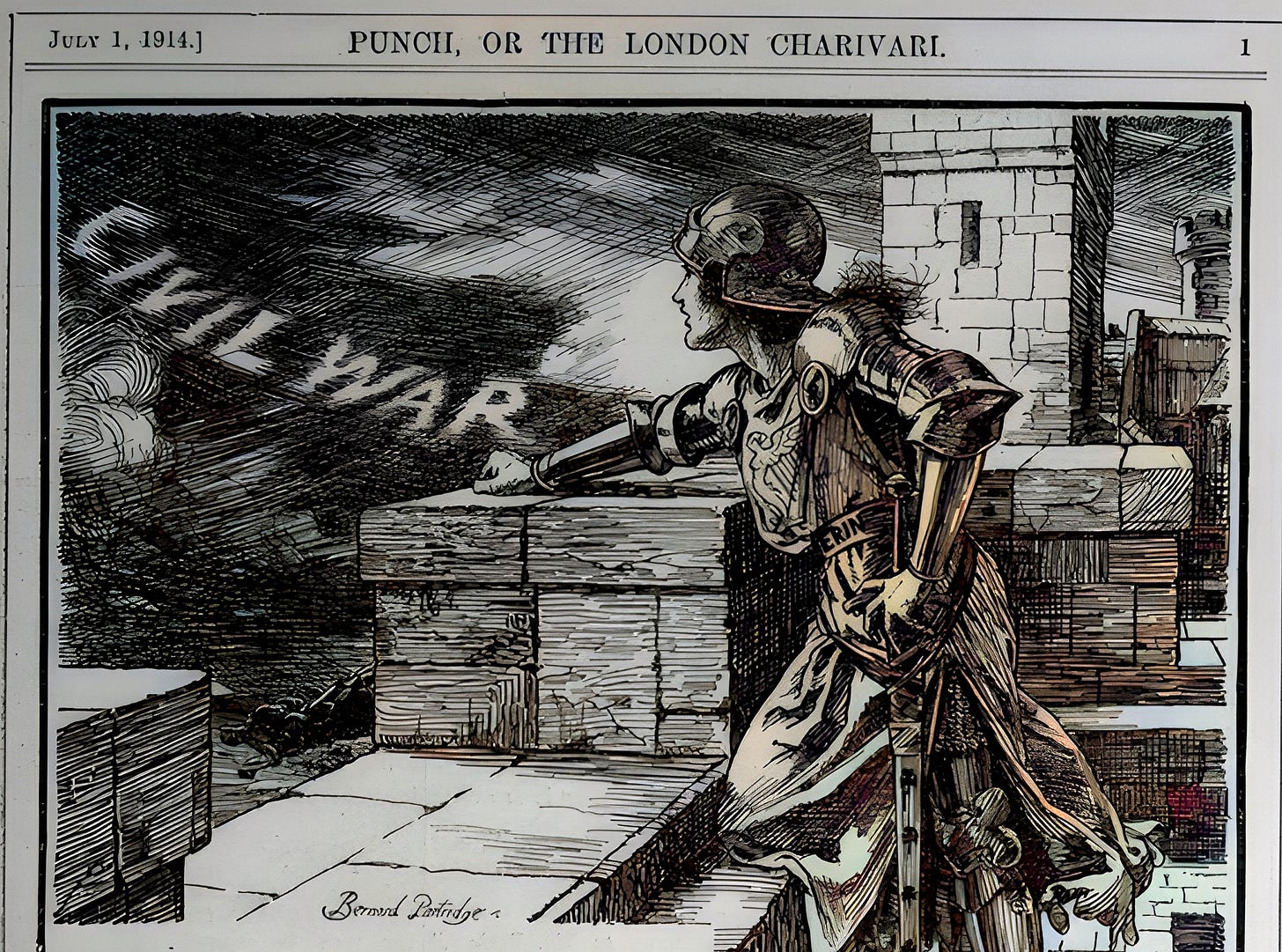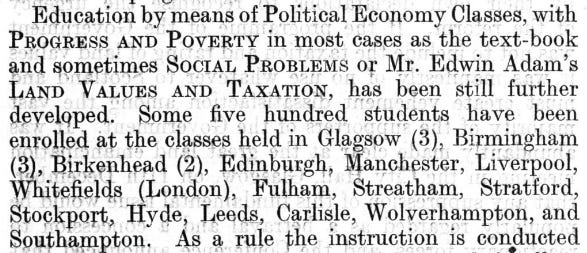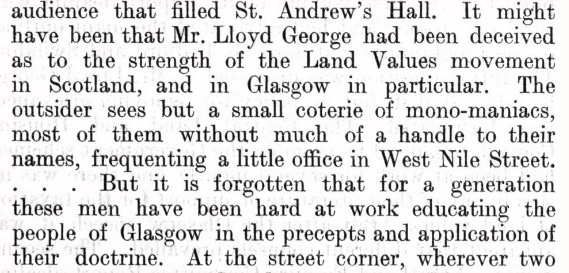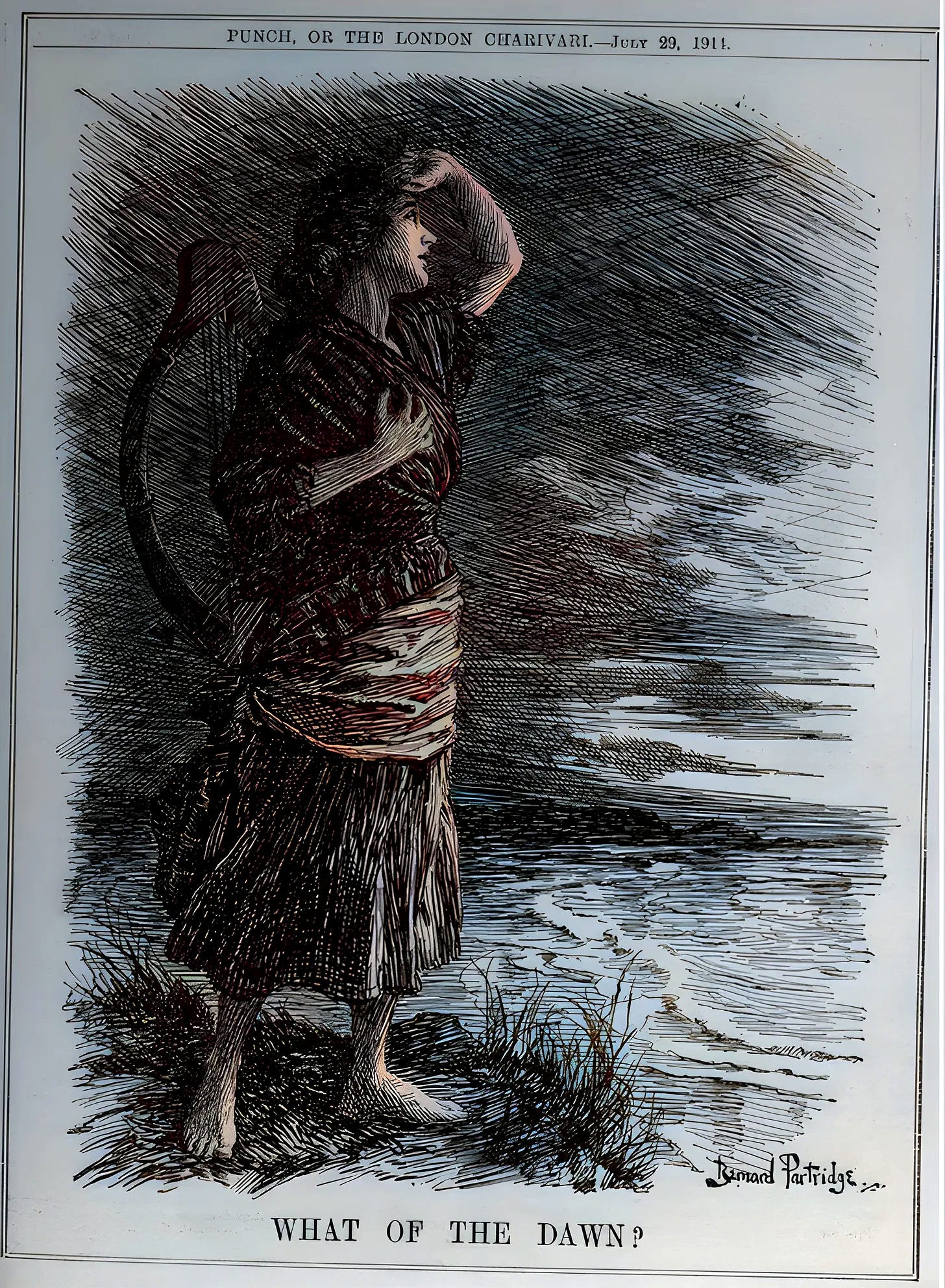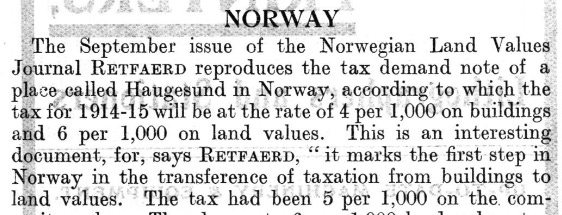War Budget 1909, War Budget 1914
"This is a War Budget … for raising money to wage implacable warfare against poverty and squalidness.”
-David Lloyd George, Chancellor of the Exchequer, 29th April 1909
The Single Tax v World War One - final part.
The material in this part goes beyond the outbreak of war but my study of Land Values trailed off after the 1914 issues. Of note is a piece called The Genesis of the War, from Decemeber 1914. Skimming through the remaining war issues, the content is reduced and subdued - one notes what is not discussed.
Arguably, the content of this series has drifted into a sensationalistic position, attributing too much to something historians attribute almost nothing to. But this drift is driven purely by accumulating evidence. This week (July 2024) I tracked down Arno Mayer’s The Persistence of the Old Regime:
Arno Mayer, The Persistence of the Old Regime
There has been a marked tendency to neglect or underplay, and to disvalue, the endurance of old forces and ideas and their cunning genius for assimilating, delaying, neutralizing, and subduing capitalist modernization
Arno Mayer’s theory
… in a sentence, is that World War One was a counterrevolution by the landed elites. This thesis fits with the evidence presented in this series.
Firstly, Mayer identifies the landed elite as the counterrevolutionary force:
The conventional wisdom is still that Europe broke out of its ancien regime and approached or crossed the threshold of modernity well before 1914. Scholars of all ideological persuasions have downgraded the importance of preindustrial economic interests. They have vastly overdrawn the decline of land … Across Europe the landed nobilities occupied first place not only in economic, social, and cultural terms but also politically.
Land remained the ruling and governing classes’ principal form of wealth and revenue until 1914.
Secondly, in his discussion of the UK, Mayer identifies land taxation as “the trigger”:
… the Lords resumed their petulant obstruction until finally, in 1909, they overwhelmingly vetoed the finance bill. They thereby intentionally challenged the House of Commons, whose fiscal prerogatives has become established in practice over three centuries … The trigger for the Lords’ audacious move was a benign land tax that Lloyd George, the “Radical-Liberal” chancellor of the exchequer, had put into the budget …
Mayer uses the word “benign” in relation to the land tax. This is puzzling - if land was the foundation of the elite, surely a direct and novel fiscal attack on land would invite more investigation. Indeed, Mayer specifically lists the defence of “fiscal privilege” as a cause of the French Revolution. This agrees entirely with Georgist history:
In the 1780s an aristocratic reaction in defence of fiscal, social, and bureaucratic privilege had become an important, possibly a decisive, underlying and immediate cause for the French Revolution. Similarly,, between 1905 and 1914 the old elites proceeded to reaffirm and tighten their political hold in order to bolster their material, social, and cultural pre-eminence. In the process they intensified the domestic and international tensions which produced the Great War.
Land Values has shown us, through Parliamentary debate transcripts and diverse sources such as political speeches and the press, that MPs and Lords fully understood the philosophy and likely consequences of Single Tax policies. The abolition of unemployment would be revolutionary, labour and productive capital would gain in market power. The landed elite in both parties regarded this attack as fatal to itself as a class. It had to be supressed immediately, before it took further hold at home and in the empire, and before the Valuation was published. What the latter might reveal was a special threat in itself. One cannot fully understand the suicidal overtones of the Lords’ behaviour during the Constitutional crisis of 1910-11, or the increasingly reckless manoeuvres in Ireland, in any other way. The landed aristrocracy was threatened by what Mayer calls “capitalist modernisation” and the Single Tax was the specific form of that threat.
On the notion that Ireland/Ulster was a proxy for a deeper conflict, Mayer continues:
“Having lost what they considered only the first skirmish in their campaign to reclaim the political power essential to their economic, social, and cultural survival, the ultras moved to exploit the Ulster resistance for their own purposes. To brace themselves for this counteroffensive, they engineered the removal of the conciliatory Balfour in favour of the tough-minded Bonar Law
“In 1912 Bonar Law denounced the Liberal government for being “a revolutionary committee which seized by fraud upon despotic power” and declared that there were “things stronger than parliamentary majorities”
- Arno J Mayer, The Persistence of the Old Regime, Europe to the Great War (1981)
How to Win
Nor is it merely the laboring-classes of Great Britain who may thus be brought into the fight, if the true standard be raised. To demand the nationalization of land by the simple means I have proposed makes possible—nay, as the discussion goes on, makes inevitable—an irresistible combination, the combination of labor and capital against landlordism. This combination proved its power by winning the battle of free trade in 1846 against the most determined resistance of the landed interest. It would be much more powerful now, and, if it can again be made on the land question, it can again force the intrenchments of the landed aristocracy.
Divide and conquer is the golden maxim of the oppressors of mankind. It is by arousing race antipathies and exciting national animosities, by appealing to local prejudices and setting people against people, that aristocracies and despotisms have been founded and maintained.
- Henry George, The Irish Land Question (1881)
Dialog from an HG Wells novel written contemporaneously
An exchange between a liberal and a tory, July 1914:
“Do you realise that the Carsonite campaign is dragging these islands within a measurable distance of civil war?”
“It’s the fault of your Lloyd George and his government.”
“The other day one of your ‘loyalists’ was talking in the Morning Post of preferring conquest by Germany to Home Rule … [and] one of your Ulster papers has openly boasted that arrangements have been made for a ‘powerful Continental monarch’ to help and Ulster rebellion.”
“You drove us to it.”
- from H G Wells, Mr Britling Sees It Through (1916)
The UK one month before the Great War.
The following editorial sums up the state of the Single Tax revolution just before the war.
“In the forefront of that policy stood the taxation of land values.”
“the land clauses of that Budget floated the Liberal Party into power at two successive elections and crippled the power of the House of Lords.”
“an attempt to exploit the sentiment for land reform while leaving out the taxation of land values is foredoomed to failure”
“But if not now, sooner or later this belief will triumph for its supporters”
“The taxation of land values is the essential reform because it has to do with the most fundamental of human relationships - the relationship of man to the earth”
“the taxation of land values is the only effective means at striking at all these evils”
“Opposition to the taxation of land values has abandoned argument”
“The forces of reaction have been stirred to greater activity than ever”
… but the Budget’s novelty in making current expenditure contingent on future revenue legislation prompted opposition from a ‘cave’ of about forty fiscally conservative Liberal MPs, and with the deadline for passing a Finance Act approaching, the Government was forced to drop the grants and postpone the requisite legislation until the autumn, by which time, of course, it had other matters to deal with.
- Paul Mulvey, The Single Taxers and the Future of Liberalism 1906-14 (2002)
Discussion of Lloyd George’s pivotal Glasgow speech (January). It is hard not to think that Lloyd George’s sudden commitment to site value rating (land value taxation for local government) in the Budget of 1914 was influenced by the pressure applied by the Scottish land reform campaign.
The death of Joseph Fels
The man who took up the international campaigning work of Henry George on his death in 1897.
“The taxation of land values and the Cause of Progress are now inextricably mixed up together in a tangle which no economist can unravel.”
“the end of all things” or
“the first fruits of the initiation of the attack upon land monopoly”
“the land monopolists are promoting rebellion in Ulster to destroy the Liberal Government because of the work begun in the Land Clauses of the Budget of 1909”
The aristocracy “realise that the taxation of Land Values involves the destruction of privilege”
“there is one thing they will not make any pretence about, and that is taxing land.”
“they mean to destroy the Parliament Act”
“above all, they mean to see that the land agitation does not mature in proposals submitted to Parliament”
Alberta - “progressed beyond the academic stage”
“the Single Tax a complete success”
“It became obvious that an internal revolution was impending in Germany”
“There is every sign that this was was premeditated and not the result of a sudden decision; it was the last effort of a caste whose power was crumbling”
“I became convinced that the Single Tax was a living faith, and not merely an abstract theory but a thing one believed in one’s soul as well.”
Henry George: “the most advanced portion of mankind are everywhere taxed so heavily to pay for preparations of war, due to two great inventions, indirect taxation and public debt”
“The theory that progress is dependent upon a conflict between individuals in which the fittest survive was met and answered by PROGRESS AND POVERTY.”
“the doctrines of Henry George involve a radical reform in our land laws, which have ever been the strongholds of privilege, and to that extent his ideas were bound to be unpopular in high places”
“the conceptions of the pseudo-evolutionists endowed the prevailing state of things with a halo of authoritative sanctity”
“the motor of human progress is the howitzer”
“This war is but the culmination of the Super-State ideal.”
“It is under this pretext that socio-biologists seek to excuse the transgressions of the powerful State upon the rights of the individual”
“To come forward with the doctrines of Henry George was to court the ostracism of established powers.”
“The present war would not have occurred had the single tax been in use.”
True Conservatism
THERE are those who may look on this little book as very radical, in the bad sense they attach to the word. They mistake. This is, in the true sense of the word, a most conservative little book. I do not appeal to prejudice and passion. I appeal to intelligence.
I do not incite to strife; I seek to prevent strife.
That the civilized world is on the verge of the most tremendous struggle, which, according to the frankness and sagacity with which it is met, will be a struggle of ideas or a struggle of actual physical force, calling upon all the potent agencies of destruction which modern invention has discovered, every sign of the times portends.
The present situation in Great Britain is full of dangers, of dangers graver and nearer than those who there are making history are likely to see. Who in France, a century ago, foresaw the drama of blood so soon to open? Who in the United States dreamed of what was coming till the cannon-shot rang and the flag fell on Sumter?
- Henry George, The Irish Land Question (1881)




